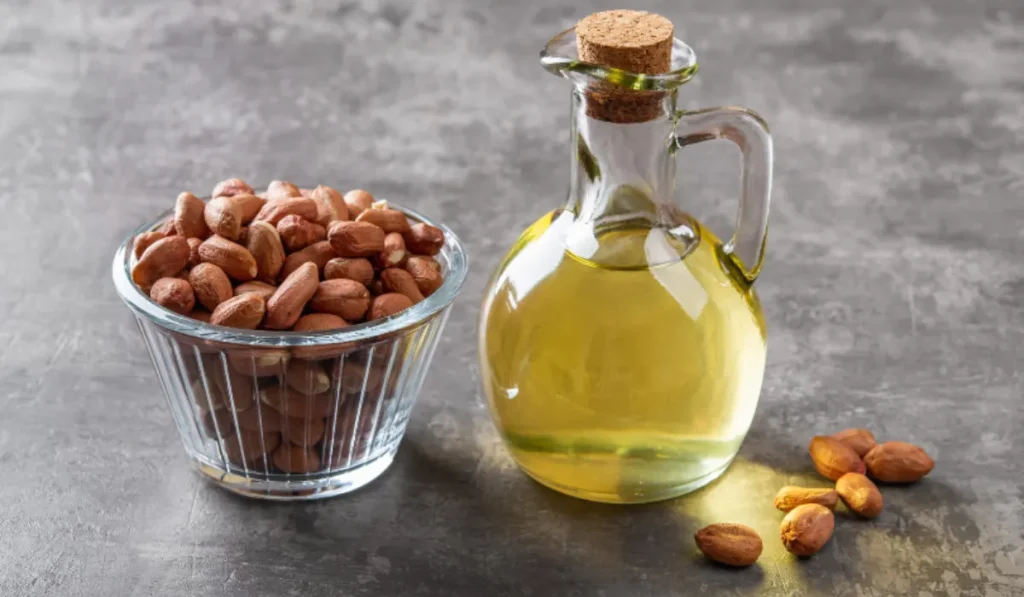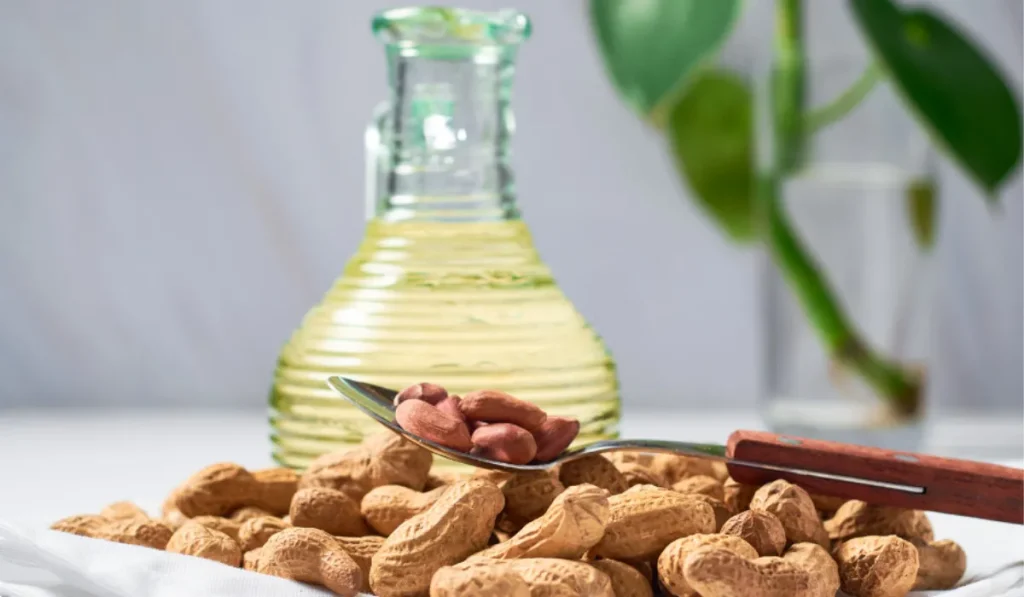A gallon of peanut oil typically weighs around 7.7 pounds. This weight can vary slightly depending on temperature and specific brand.
Peanut oil is commonly used for frying and cooking due to its high smoke point and nutritional value, often preferred by chefs and food enthusiasts.
Understanding the weight of a gallon of peanut oil is crucial for both home cooks and professional kitchens, ensuring precise measurements and consistent results.
Whether you’re deep-frying a turkey or simply sautéing vegetables, the density of peanut oil plays a key role in the kitchen.
This knowledge also helps when calculating shipping costs for bulk orders or managing inventory in commercial settings.
With health-conscious consumers turning to peanut oil for its heart-healthy profile, providing its weight information enhances the overall cooking experience and menu planning.
Weights And Measures: Peanut Oil
Gallon of peanut oil weight interests chefs and home cooks. Unique density, unlike water, twists the plot.
Discover the mystery behind a gallon of peanut oil’s weight. Recipes call for precise measurements. Let’s unveil the secrets within the world of cooking oils.
The Basics Of Volume And Weight
Grasping volume and weight basics proves essential in the kitchen. A gallon measures volume, not weight. Peanut oil’s gallon translates into pounds differently.
- Volume: Space a liquid occupies.
- Weight: Mass, often in pounds or kilograms.
Peanut Oil Density Factors
Peanut oil’s density, lighter than water, affects its weight. Temperature and purity tweak its density. Below is a table showing how volume relates to weight, considering average density.
| Volume (Gallons) | Weight (Pounds) |
|---|---|
| 1 | 7.6 approx. |
| 1/2 | 3.8 approx. |
| 1/4 | 1.9 approx. |
Gallon To Pounds Conversion

Understanding the gallon to pounds conversion is crucial when working in the kitchen, especially for those who often use peanut oil for cooking.
Peanut oil, known for its high smoke point and neutral taste, is commonly sold in gallons, but chefs and bakers might require its weight in pounds for precise recipes.
Calculating Peanut Oil Weight
One gallon of peanut oil typically weighs around 7.6 pounds. The weight can slightly vary with temperature, but for most kitchen purposes, this conversion is reliable. Below is a simple calculation:
1 gallon peanut oil ≈ 7.6 pounds
To calculate the weight for multiple gallons, just multiply 7.6 by the number of gallons you have.
- 2 gallons ≈ 15.2 pounds
- 3 gallons ≈ 22.8 pounds
- 4 gallons ≈ 30.4 pounds
Comparisons With Other Cooking Oils
Peanut oil is comparable to many other cooking oils in terms of weight. A gallon of vegetable, corn, or canola oil also weighs around 7.5 to 8 pounds. Check out this easy comparison:
| Type of Oil | Weight per Gallon (pounds) |
|---|---|
| Peanut Oil | 7.6 |
| Vegetable Oil | 7.5 |
| Corn Oil | 8.0 |
| Canola Oil | 7.7 |
Kitchen Math: Practical Measurements
Understanding the weight of common ingredients like peanut oil can make cooking simpler. Various recipes call for precise measurements.
Knowing how much a gallon of peanut oil weighs is crucial for consistent, delicious results in the kitchen.
Measuring Peanut Oil At Home
Weighing peanut oil accurately ensures dishes turn out as expected. A kitchen scale is the best tool for this job.
- Place a container on the scale.
- Tare the scale to zero with the container on it.
- Pour peanut oil into the container until the scale reads 8.34 pounds (1 gallon).
Note: A gallon of peanut oil typically weighs around 8.34 pounds. But the weight can vary slightly based on temperature and purity.
Estimation Techniques For Recipes
Sometimes, precise scales are not available. Use these estimation techniques:
- A standard cup holds about 0.52 pounds of peanut oil.
- A quart equates to approximately 2.09 pounds.
- Half-gallon containers should be around 4.17 pounds.
For a quick reference, consider the following table:
| Volume | Weight (in pounds) |
|---|---|
| 1 Cup | 0.52 |
| 1 Quart | 2.09 |
| 1/2 Gallon | 4.17 |
| 1 Gallon | 8.34 |
Remember: These are rough estimates. For best results, measure the oil.
Impact Of Temperature On Peanut Oil Weight

The weight of peanut oil can change with temperature. Warming the oil up makes it lighter. Cooling it down makes it denser.
This means a gallon of peanut oil won’t always weigh the same. Chefs and bakers who use large quantities need to know this. It can make their recipes more accurate.
Temperature-weight Relationship
Peanut oil, like most liquids, expands when heated and contracts when cooled. These changes can affect the weight of oil.
For example, a gallon at 60°F (15.6°C) typically weighs 7.7 pounds. If that temperature goes up or down, the weight changes. The exact weight will therefore vary with kitchen temperatures.
In general, the warmer the oil, the lighter it becomes:
- Cold temperatures make peanut oil heavier.
- Warm temperatures make it lighter.
Adjusting For Kitchen Conditions
In a home or restaurant kitchen, conditions differ. Sometimes, kitchens are warm. Other times, they are cool. It’s important to know this to use the right amount of oil.
To adjust for different temperatures, weighing your oil is best. Here are steps to do it right:
- Place your container on a scale and zero it.
- Pour in the peanut oil until it reaches one gallon.
- Note the weight on the scale.
This way, you ensure the right weight, no matter the room temperature. Keeping your recipes precise means tasty results every time!
Buying Peanut Oil: Tips And Tricks
Welcome to our guide on the essentials of buying peanut oil, a staple ingredient in many kitchens.
With numerous options available, selecting the right oil can be daunting. Let’s dive into understanding labels, gauging quantities, and storage to make your purchase a breeze.
Understanding Labels And Quantities
When choosing peanut oil, labels provide valuable information. Look for ‘refined’ or ‘unrefined’ to understand the production process.
Refined oils are more processed, offering a higher smoke point perfect for frying. Unrefined oils, on the other hand, are less processed, preserving more natural flavors.
Quantities matter too. Peanut oil typically comes in gallons or liters. A gallon of peanut oil weighs about 7.7 pounds (3.49 kg). Check the label for exact weight to ensure you get enough oil for your cooking needs.
Storage And Shelf Life Considerations
Proper storage extends the shelf life of peanut oil. Keep your oil in a cool, dark place away from direct sunlight. Once opened, sealing the bottle tightly prevents oxidation, which can spoil the oil.
Peanut oil can last up to two years unopened, but always check the expiration date. Once opened, use it within six months to enjoy its best quality. If your usage is infrequent, consider buying smaller bottles to avoid waste.
| Type | Use | Shelf Life |
|---|---|---|
| Refined | High-heat cooking | Up to 2 years |
| Unrefined | Flavorful dressings | 6 months after opening |
| Bulk Quantities | Frequent use | Check weight on label |
| Smaller Bottles | Less frequent use | Avoids waste |
Remember these points for a smart buy and optimal use of peanut oil. Prioritize quality and your specific needs for the best cooking experience. Stay tuned for more tips and tricks in the kitchen!
FAQs About the Weight of A Gallon Of Peanut Oil
What Is The Weight Of Peanut Oil Per Gallon?
A gallon of peanut oil typically weighs around 7. 7 pounds. Factors such as temperature can cause slight variations.
Can Peanut Oil’s Weight Vary?
Yes, the weight can slightly differ based on temperature and purity. However, the weight is fairly consistent at 7. 7 pounds per gallon.
Why Does Peanut Oil’s Weight Matter?
Knowing the weight is crucial for cooking, shipping, and storage. Accurate measurements ensure recipe success and efficient logistics planning.
How To Convert Gallons Of Peanut Oil To Pounds?
To convert, multiply the gallon volume by 7. 7. For example, 2 gallons of peanut oil would weigh approximately 15. 4 pounds.
Conclusion
Wrapping up our exploration, we now know that a gallon of peanut oil typically weighs around 7. 7 pounds.
This knowledge is not just a fun fact, but crucial for culinary enthusiasts and professional chefs alike. Keep this tidbit handy for your next kitchen adventure, ensuring accuracy when recipes call for weight-based measurements.
Remember, understanding ingredient specifics can significantly impact your cooking success.
Resources:
https://extension.okstate.edu/fact-sheets/print-publications/fapc-food-and-agricultural-products-center/why-peanut-oil-is-good-for-frying-food-fapc-231.pdf
https://fdc.nal.usda.gov/fdc-app.html#/food-details/2345744/nutrients
